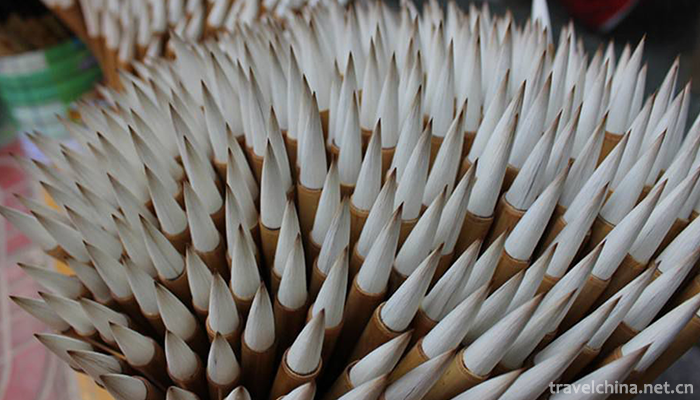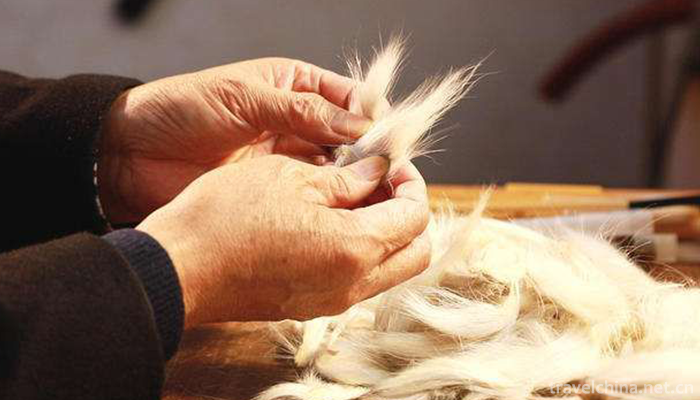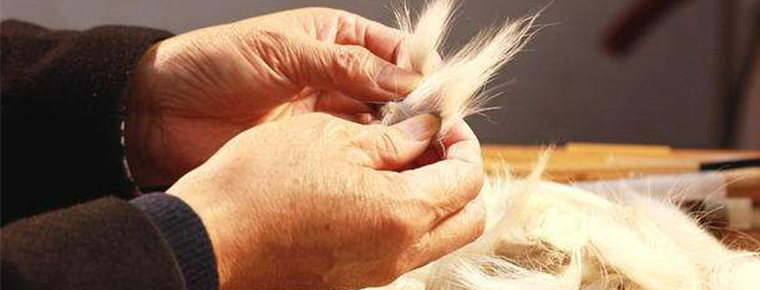Brush making skills
Brush making skills
Brush making skills, local folk traditional skills in Huangpu District of Shanghai and Jiangdu District of Yangzhou City of Jiangsu Province, one of the national intangible cultural heritage.
Brush making technique is a traditional handmade technique with a long history in China. It is made of animal hair tied into a pen head and then bonded to a tubular pen pole. Zhou Huchen's brush making skill is a combination of Hu Pen, Water Pen and Calligraphy and Painting Brush. It integrates the brush making skills of South China and creates Shanghai style brushes, which make Shanghai style brushes accompany with Shanghai style calligraphy and painting. Yangzhou brush making technology is unique with its numbness as a foil. It has been well-known for more than 400 years. Its production technology is mainly retained in Jiangdu Traditional Chinese Painting Brush Factory, located in Huadang, Jiangsu Province.
In 2009, the craftsmanship of brush making was approved by the State Council of the People's Republic of China and listed in the second batch of national intangible cultural heritage list, project number_-200.
Zhou Huchen's Brush
Zhou Huchen's brush making skills are named after the founder Zhou Huchen and accumulated by Zhou Huchen's Brush and Ink Zhuang (Pen Factory) in more than 300 years.
In 1694, descendants of Zhou Huchen set up Zhou Huchen Bimozhuang from Jiangxi to Suzhou.
After the opening of Shanghai, Zhou Huchen Bimozhuang moved from Suzhou to Huangpu District in 1862.
In 1958, it amalgamated ten pen and ink banks in Shanghai and established old Zhou Huchen pen and ink banks.
In 1987, the company expanded its scale and established Shanghai Lao Zhou Huchen Pen Factory.
Yangzhou brush
Yangzhou brush (also known as "Yangzhou fountain pen") is unique with its numbness as a backing. History of the Qing Dynasty records: "Yangzhou Zhongguan Rat Heart Painting Brushes are excellent for brushing and painting, and the fountain brushes are also wonderful."
In 1747, Ren Wenyuan's family pen-making workshop was founded by Ren's family. Up to now, a seal of "Bridge Ren Wenyuan Bookstore" in Zhendian is still treasured. Before the 1950s, Yangzhou fountain pens were distributed in Huadang, Daqiao, Zhengyi, Zhanggang, Wuqiao and Yangzhou City, and their products were sold all over the country and even overseas. Contemporary, Jiangdu Traditional Chinese Painting Brush Factory keeps complete production skills, adheres to the production of Yangzhou fountain brushes, and has become an important export base of brushes.
Process characteristics
Zhou Huchen's Brush
Zhou Huchen integrates the skills of many families in making brushes, and integrates the strengths of each family. On the basis of inheriting the traditional skills, he constantly innovates the skills of making brushes, from making wolf pens to making lamb pens and both of them to making wolf pens. Combining with the characteristics of Shanghai style calligraphers and painters, he creates the techniques of making brushes such as "waist-strengthening method", "top-up method", "top-up method", "refinement method" and animal hair.“ Configuration method"improves the use of brush function.
Yangzhou brush
Yangzhou brush production technology is unique, natural materials, complex technology, all by hand, tongue and visual production.
Yangzhou brush, with water into the set, watertight, durable; pen strokes, complement each other; elegant character, strong charm. The representative work "Xiangjiang Yipin" has been praised as "the king of the pen".
Technological process
Yangzhou brushes are made of wolf hairs and rabbit tips (hair on rabbit's back) as main raw materials and porous hemp as auxiliary materials. The materials used in pen making are bamboo, Nanmu, Haimei, Niujiao, jade, ivory, porcelain carving paint, cloisonne, etc. The auxiliary materials are rosin, rice clay, alum, sulfur, silk thread, top stone, lead paint, pen repairing glue, etc. Its production can be roughly divided into three parts: water basin, suit and dry farming, including material selection, tearing, combing, picking, top hairs, uniform hairs, pressing hairs, brushing hairs, whole hairs, linen-making, lining, lining, round pen, capping hairs, brush-setting, flat head, winch, pen-setting, pen-repairing, engraving and more than 120 working procedures.
Inheritance and protection
Inheritance value
"Zhou Huchen" combines the skills of Lake brush, fountain brush and calligraphy and painting brush, integrates the skills of southern China, and creates Shanghai style brush, which is accompanied by Shanghai style brush and calligraphy and painting.
The craftsmanship of Yangzhou brush has extremely important historical and cultural value and technological value.
Inheritance status
For thousands of years, the craftsmanship of Yangzhou brush production has been following the way of inheritance of the family, teachers and apprentices, and the inheritance context is clear. There are Ren's family inheritance pedigree and teacher-apprentice inheritance pedigree. There are 130 original pen-making workers in Jiangdu Traditional Chinese Painting Brush Factory, but now there are only twenty or thirty. The inheritance of skills has become a problem, and no real inheritor has yet been found. In the past, brush making skills were taught within the family, but not outside. Later, this rule was broken.
At present, the brush market is shrinking day by day. Making brushes is all manual work, complicated and hard work, low social status and poor wages. Young people are not interested in learning crafts. Over time, the brush making industry has been scarce and is on the verge of crisis.
Inheriting characters
Wu Qingchun, male, born in 1961. In 2012, Wu Qingchun was selected as the representative successor of the fourth batch of national intangible cultural heritage projects and declared in Huangpu District, Shanghai. Declaration items: brush making skills.
Shi Qingpeng, male, born in 1948. In 2012, Shi Qingpeng was selected as the representative successor of the fourth batch of national intangible cultural heritage projects, Jiangdu City of Jiangsu Province declared. Declaration items: brush making skills.
protective measures
In 2013, Jiangdu Traditional Chinese Painting Brush Factory, as the only one to preserve the complete production skills of Yangzhou brushes, received special funds from the Ministry of Culture for non-heritage protection. After consulting a large number of literary and historical materials and field research, Shi Qingpeng, the representative inheritor of the national intangible cultural heritage project, and experts combed the production skills of Yangzhou brush.
Jiangdu Traditional Chinese Painting Brush Factory investigates and studies the historical origin, inheritance context, technical characteristics, related objects and appliances of Yangzhou brush, establishes Yangzhou Brush Production Technology Committee, establishes Yangzhou Brush Production Technology Training Institute and Master's Studio, regularly teaches primary school students the skills of Yangzhou brush production, and compiles and publishes the monograph "Beauty is immortal in the world: Yangzhou Brush"; Shi Qingpeng's Six Lectures on the Art of Pen Making and the Popular Readings of Brushes and Painting and Calligraphy.
At the end of 2008, the Shanghai Brush and Ink Museum was established. It has become the exhibition center of Zhou Huchen's brush making skills and Cao Sugong's ink ingot making skills. It is also the "national demonstration base for the productive protection of intangible cultural heritage".
social influence
Domestic influence
Honorary commendation
Zhou Huchen's brush once produced "Shoubi" for Emperor Kangxi of the Qing Dynasty, "imperial brush" for Emperor Qianlong, custom brush for calligraphers and painters, and "Dragon-Phoenix Painting" for the Beijing Olympic Games.
Jiangsu Jiangdu Traditional Chinese Painting Brush Factory's "Longchuan" brand brush has won national gold medals and international gold medals for many times, and is known as the "treasure of the country".
Zhou Huchen's "Dragon and Phoenix Painting" was inscribed by Wu Qingchun, a licensed commodity for the 2008 Beijing Olympic Games. His works have been collected in the National Museum of Tibet.
Important exhibition
On November 5, 2018, Zhou Huchen's brush making skills appeared at the first China International Import Expo.
Foreign influence
Zhou Huchen's brush products have a wide market and good reputation in Japan, Korea, Southeast Asia and Hong Kong, China and other countries and regions.
Jiangsu Jiangdu Painting Brush Factory has developed into more than 1600 kinds of Chinese painting and calligraphy brushes in five categories, and has become an important production base in Asia.



-
1.The Good friends rice noodles
Laoyou powder is a local delicacy in Nanning, Guangxi. In 2007, it was selected as the first 26 items of intangible cultural heritage list published by Nanning.
Time 2018-11-03 -
2.Royal Prime Ministers Palace
Huangcheng Xiangfu (National AAAAA Scenic Area) is located in Beiliu Town, Yangcheng County, Jincheng City, Shanxi Province.
Time 2018-11-24 -
3.JiuMenKou Great WallTime 2018-12-22
-
4.Jinjiang Amusement Park
Jinjiang Paradise is the first large-scale modern amusement park in Shanghai, China. It covers an area of 170 Mu and has 40 amusement projects. It is suitable for tourists of all ages. It receives abo
Time 2019-01-29 -
5.Weihai Tianmu Hot Spring Resort
Tianmu Hot Spring Resort Project invested 600 million yuan by Zhuhai Tianmu Group. A total of 35,000 square meters were opened in September 2008.
Time 2019-02-22 -
6.Xixi Wetland Tourist Area
Xixi National Wetland Park is located in the west of Hangzhou City, Zhejiang Province. It is only 6 kilometers away from Wulin Gate, the main city of Hangzhou, and 5 kilometers away from West Lake.
Time 2019-02-25 -
7.Baxian longevity noodles
Make it with Udonghua noodles. With turtle, old turtle boiled soup, turtle has a nourishing role, old turtle represents longevity. Take shrimp, squid, sea cucumber, black fish balls
Time 2019-03-27 -
8.One Man show
A kind of folk art. It is usually performed by one or two or three people. It is lively and funny, close to northern crosstalk. It is popular in Shanghai, Hangzhou and other places.
Time 2019-04-28 -
9.Nanyin Rap
Nanyin rap is a form of rap sung in Guangzhou dialect. It is also a common melody in Cantonese opera and Cantonese opera. It is said that Nanyin rap was developed on the basis of wooden fish and drago
Time 2019-06-07 -
10.Cuisine Skills of Official Cuisine in Zhili
The culinary skill of official dishes in Zhili is a precious cultural heritage of Baoding ancient city. Since the Qing Dynasty and the Republic of China, official cuisine and cooking skills in Zhili h
Time 2019-07-25 -
11.Song pool of the Zhuang nationality
Song pool of the Zhuang nationality is a form of Festival gathering and singing activities held by the masses of the Zhuang nationality at a specific time and place.
Time 2019-08-16 -
12.Sports in Panzhihua
By the end of 2018, Panzhihua had 21 stadiums (gymnasiums), 56 sports social groups at all levels, 694 national fitness routes and 263 social sports guidance stations. The city's various sports teams won 80 gold medals, 91 silver medals and 72 bronze medals in provincial competitions. 124 national fitness activities were held throughout the year, with 460000 participants.
Time 2020-12-14